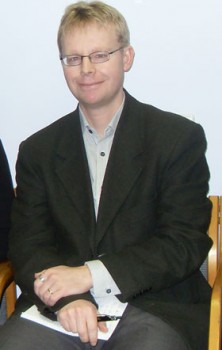Martin Uggla: “We should demand the release of political prisoners now, but that is not enough…”
Martin Uggla: “We should demand the release of political prisoners now, but that is not enough…”
Martin Uugla, chair of the Östgruppen Swedish Initiative for Democracy and Human Rights, was not allowed to enter Belarus during the recent political campaign of 2010. It was a fourth travel ban by the Belarusian authorities used against Mr. Uugla since 2006.
Östgruppen has always closely monitored the human rights developments in Belarus, releasing timely reactions on most blatant abuses.
The 2010 presidential election, together with its aftermath, could not but be criticized by Östgruppen.
In his interview, Mr. Martin Uugla speaks on the current situation in Belarus and evaluates the working conditions of Belarusian human rights defenders.
- Mr. Uugla, you were denied a Belarusian visa during the presidential election. Was the decision a surprise to you?
- I can say this is a predictable decision. It was not the first denial. And I know that the Belarusian authorities do not like the criticism that I regularly express concerning the situation in Belarus. Therefore, it was predictable to me, but, nonetheless, I am sorry it happened this way.
- Having been denied to enter Belarus, you probably kept an eye on the election campaign, as Belarus is one of Östgruppen’s target areas. How can you evaluate the 2010 presidential election and what aspects are most crucial for you as a human rights defender?
- Apparently, the presidential election was marked by mass rigging. In my opinion, it is very important to stress that the rigging occurred not only on the polling day. It is often forgotten that this is a process and throughout the process we could regularly see that it was created to help Lukashenka win the election.
- Could you, please, share your impressions on what happened in Minsk in the evening of 19 December…
- I should say it was a shock. And it is somehow surprising that the regime allowed such violent actions against the demonstrators. Surely, what happened and is still happening in Belarus is very alarming, i.e. the ongoing wave of repressions. I shall repeat myself: it is very alarming. And, under current circumstances, it is the reactions from the international structures that matter, so that it would not pass unnoticed.
- What do they say about Belarus in your country?
- In Sweden, they are constantly speaking about Belarus at the moment. They are speaking of possible sanctions, of how Sweden should treat the Belarusian regime in general. I should note that Sweden has not seen such active debates for quite a long time. It goes to show that Swedes are interested in what is going on in Belarus and they are very impressed by the developments.
- At present, the situation in Belarus is very tense, the civil society is at the gunpoint of the government. How can you evaluate the situation of the Belarusian human rights defenders and their working conditions?
- The situation arises much concern. On the one hand, it is clear that the human rights defenders are now subject to repressions, since it is the human rights defenders who actively worked to make the election free, so that the people could vote freely. Since the wave of repressions does not cease, which is absolutely intolerable, the human rights defenders should be protected, because their work is very important for improving the situation in Belarus.
- How can the European human rights defenders impact the human rights situation in Belarus and help their Belarusian partners?
- Firstly, it is crucial to very clearly express one’s opinion and influence one’s own politicians, so that they could take a harsh decision and speak very decisively on Belarus. It is a kind of a political support, which is very important now. Secondly, it is important to establish a close contact between us, so that we could help disseminate information on what is happening. Thirdly, we should do our best to help, in the practical way, to facilitate the work of Belarusian human rights defenders.
- Today, it is the issue of the European Union’s sanctions against the official Minsk that appears to be most crucial. What is your position on the issue?
- Indeed, sanctions should be re-imposed. However, there is another issue – how can these sanctions be formulate and worked out. It is a rather difficult question: on the one hand, we would like to apply as much impact on actual changes in Belarus. I believe that we should demand the release of political prisoners now, but that is not enough. It is necessary that the terms mentioned demands for real, systemic changes of Belarusian legislation, so that it would be impossible to return to new repressions in the future. I mean Article 193-1, which prohibits people to freely gather in associations. There are other legal means to be changed to actually change the situation.


















